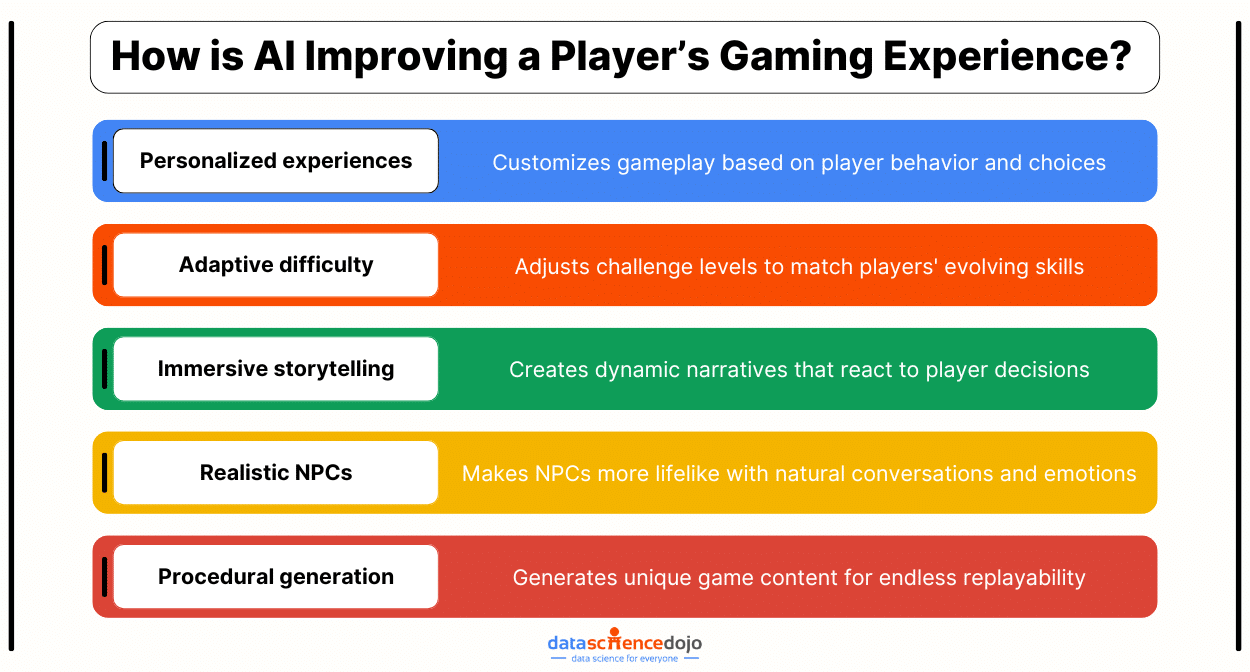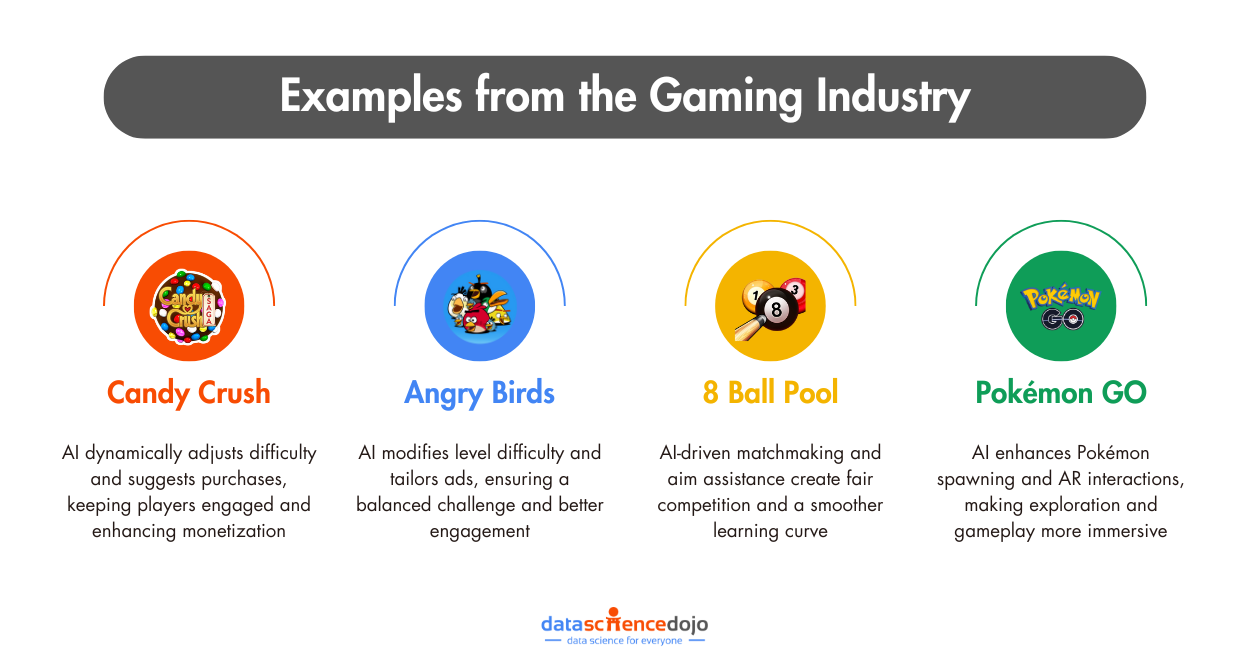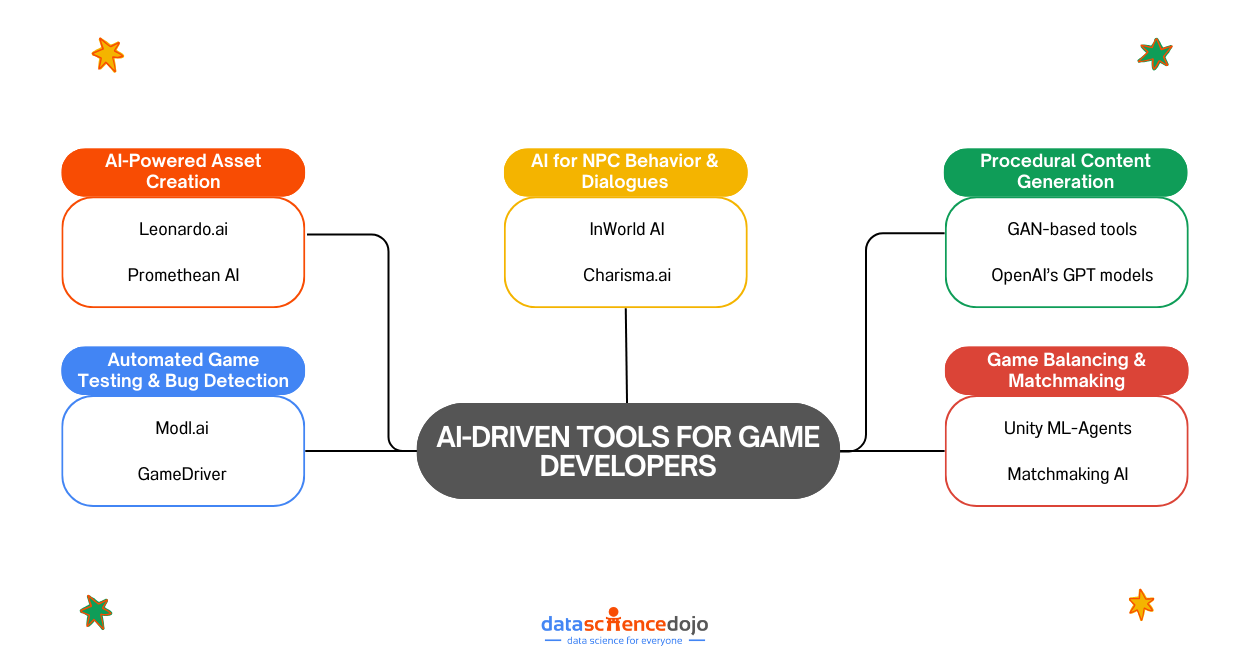You didn’t notice it happening – no announcement, no grand reveal, yet, over time, your favorite games got smarter. Each new level matched your skill perfectly, and in-game characters became more lifelike; thus, you kept coming back for more.
This is not luck or just good game design but AI at work. From adjusting difficulty in real time to crafting immersive storylines, AI-driven technology has quietly reshaped the casual gaming industry. It’s not a futuristic concept and is already deeply embedded in the games we play every day.
The casual gaming industry has seen a significant rise in popularity in recent years, with mobile games like Candy Crush and Angry Birds becoming household names. But what is driving this growth?
How exactly is AI shaping the world of gaming? And where is it taking us next? Let’s take a closer look.
In this article, we will explore how AI-driven technology is revolutionizing the casual gaming industry and its impact on game development, player experience, and the future of gaming.

The Rise of AI-driven Technology in the Gaming Industry
AI-driven technology is reshaping the gaming industry, making games smarter, more engaging, and highly personalized. From streamlining game development to enhancing player experiences, AI transforms how games adapt, respond, and evolve.
Let’s explore how AI is driving innovation in game design and gameplay.
AI-Driven Innovation in Game Development
AI-driven technology has revolutionized the way games are developed. Traditionally, game developers would have to manually code every aspect of a game, from character movements to enemy behavior. This process was time-consuming and limited the complexity of the games that could be created.
With AI-driven technology, game developers can now use machine learning algorithms to create more complex and dynamic games. These algorithms can analyze player behavior and adapt the game accordingly, creating a more personalized and engaging experience for players.
Improving Player Experience
AI-driven technology has also greatly improved the player experience in casual games. With the use of AI, games can now adapt to a player’s skill level, providing a more challenging experience for advanced players and a more accessible experience for beginners.
AI can also analyze player behavior and preferences to provide personalized recommendations for in-game purchases, making the gaming experience more tailored to each individual player.
Let’s delve into some specific ways AI can enhance the gaming landscape.
Personalized experiences: AI can tailor gameplay to individual player preferences, creating a unique experience for each person. By analyzing player behavior and choices, AI can adjust difficulty levels, generate personalized quests, and suggest activities that align with the player’s interests.
Example: In the game “Left 4 Dead,” AI-powered “Director” system dynamically adjusts the gameplay based on the players’ performance, ensuring a challenging yet enjoyable experience for all.
Explore personalized text generation with Google AI
Adaptive difficulty: AI can provide an adaptive difficulty system that automatically adjusts the challenge level based on the player’s skill. This ensures that the game remains engaging and prevents players from getting frustrated or bored.
Example: In the game ‘Assassin’s Creed’, the AI monitors the player’s progress and adjusts the strength of enemies accordingly, keeping the game challenging without becoming overwhelming.
Immersive storytelling: AI can enhance storytelling by creating dynamic narratives that adapt to player actions and choices. This allows for branching storylines, unpredictable plot twists, and a more immersive connection between the player and the game’s world.
Example: In the game “The Witcher 3: Wild Hunt,” AI drives the narrative based on the player’s decisions, leading to multiple endings and a sense of consequence for the player’s actions.
Realistic NPCs: AI can create more realistic and engaging non-player characters (NPCs) that can converse naturally, respond to player actions, and exhibit emotions. This can make the game world feel more alive and immersive.
Example: In the game “Detroit: Become Human,” AI-powered characters engage in meaningful conversations with the player, making their actions and decisions feel more impactful.
Procedural generation: AI can procedurally generate game content, such as levels, items, and challenges, providing endless replayability and a fresh experience with each playthrough.
Example: In the game ‘No Man’s Sky’, AI algorithms generate vast and varied planets, ensuring that players constantly encounter new and exciting environments.
Hence, AI is an integral part of modern gaming. It continues to push the boundaries of what is possible in gaming. As technology evolves, AI-driven games will only become more dynamic, personalized, and engaging.
Examples from the Gaming Industry
From adaptive difficulty adjustments to AI-powered recommendations, game developers are using artificial intelligence to enhance player experiences in exciting ways.
Let’s explore how popular games leverage AI to improve gameplay and keep players coming back for more.
Candy Crush – Adaptive Difficulty & Personalized Challenges
Candy Crush, one of the most popular mobile games of all time, is a prime example of how AI-driven technology has revolutionized the casual gaming industry. The game uses AI algorithms to analyze player behavior and adapt the difficulty of each level accordingly.
This not only provides a more personalized experience for players but also keeps them engaged and motivated to continue playing. The game also uses AI to recommend in-game purchases based on player behavior, increasing revenue for the developers.
Angry Birds – Dynamic Level Adjustments & AI-Powered Recommendations
Another popular mobile game, Angry Birds, also utilizes AI-driven technology to enhance the player experience. The game uses AI algorithms to analyze player behavior and adjust the difficulty of each level to keep players engaged and challenged.
Additionally, the game uses AI to generate personalized ads for players, increasing their chances of making in-game purchases.
8 Ball Pool – AI-Based Skill Matching & Game Assistance
8 Ball Pool is one of the most popular mobile pool games. The game’s AI-driven matchmaking system analyzes a player’s skill level, win-loss ratio, and gameplay patterns to pair them with opponents of similar ability, ensuring a fair and competitive experience.
AI also helps new players by providing subtle aim assistance. The system slightly adjusts the shot direction and force to guide beginners without making the game too easy. These AI-driven features make 8 Ball Pool a smoother and more enjoyable gaming experience for players at all levels.
Pokémon GO – AI-Driven Spawning & Augmented Reality Enhancements
Pokémon GO has continuously evolved since its launch, and AI has played a key role in improving gameplay. The game analyzes player activity, location trends, and past behaviors to determine which Pokémon should appear and where. It makes hunting for Pokémon feel more dynamic and rewarding.
AI has also enhanced Pokémon interactions in Augmented Reality (AR) mode. Pokémon now react more naturally to the player’s environment, making them feel more lifelike. These improvements create a more immersive and engaging AR experience, making the game even more enjoyable when catching Pokémon.
Learn about threats of Generative AI and its uses
Whether it’s adjusting difficulty levels, enhancing matchmaking, or making in-game interactions feel more realistic, AI-driven innovations are pushing games to new heights. As technology advances, we can expect even smarter, more personalized gaming experiences that cater to every type of player.
List of AI-Driven Tools for Game Developers
AI-driven technology is not just limited to game development and player experience. It is also being used to create tools and software that aid game developers in the development process. These tools automate tasks, enhance creativity, and improve efficiency.
It helps developers generate content, create smarter characters, and optimize performance, allowing them to focus more on innovation rather than repetitive coding.
Let’s explore some key AI-driven tools that are useful for game developers.
1. AI-Powered Asset Creation
Creating high-quality game assets can be time-consuming, but AI-powered tools help speed up the process by automatically generating textures, characters, and environments.
- Leonardo.ai – Uses AI to generate game assets such as concept art, textures, and character models, allowing developers to produce high-quality visuals with minimal effort.
- Promethean AI – Helps designers build immersive environments by automatically arranging assets in a way that feels natural, significantly reducing level design time.
These tools enhance creativity while minimizing the manual workload of game artists.
2. AI for NPC Behavior & Dialogues
AI-driven tools improve NPCs by making them more intelligent, interactive, and responsive to player actions.
- InWorld AI – Creates AI-powered NPCs with unique personalities, emotions, and conversational abilities, making interactions feel more realistic.
- Charisma.ai – Enhances storytelling by enabling NPCs to engage in meaningful, dynamic conversations with players, adjusting responses based on player choices.
This makes NPCs feel more lifelike, leading to a more immersive gaming experience.
3. Procedural Content Generation
Procedural generation allows developers to create vast, dynamic game worlds without manually designing every detail.
- GAN-based tools – Use AI-generated patterns to create textures, landscapes, and entire levels, ensuring variety in game environments.
- OpenAI’s GPT models – Help generate dynamic quests, storylines, and in-game text, allowing for richer and more varied narratives.
With these tools, developers can create expansive, ever-changing game worlds that keep players engaged.
Here’s a list of top AI content generators
4. Automated Game Testing & Bug Detection
AI-driven testing tools help detect bugs, optimize performance, and ensure smoother gameplay before a game is released.
- Modl.ai – Uses machine learning to play through games like a real player, identifying issues such as level design flaws and gameplay imbalances.
- GameDriver – Automates the testing process by running simulations, reducing the need for human testers and speeding up the development cycle.
These tools improve game quality by catching errors early and reducing the risk of post-launch bugs.
5. AI-Driven Game Balancing & Matchmaking
AI ensures fair competition by adjusting difficulty levels and pairing players based on skill.
- Unity ML-Agents – Trains AI models to adjust game difficulty dynamically, ensuring that both beginners and experienced players stay engaged.
- Matchmaking AI – Analyzes player skill, past performance, and playstyle to create fair and balanced multiplayer matchups.
By optimizing game balance, these tools make gaming experiences more enjoyable for all players.
AI-driven tools are shaping the future of game development, making it more efficient, creative, and player-focused. As the technology continues to advance, we can expect even more innovative tools that push the boundaries of game design.
The Future of Gaming: How AI is Transforming Play for Everyone
AI-driven technology has become a game-changer in the gaming industry, shaping how games are developed, played, and experienced. It offers players a richer and more enjoyable experience tailored to their preferences and skill levels.
For developers, AI-powered tools streamline workflows, enhance creativity, and open new possibilities in game design. However, the true potential of AI in gaming can only be unlocked through strong collaboration between game developers and AI experts.
By working together, they can refine AI algorithms, push the boundaries of innovation, and create even more immersive and intelligent gaming experiences. As technology continues to evolve, AI-driven advancements will keep redefining the industry for smarter and more interactive games.









